#Unity Game Development
Explore tagged Tumblr posts
Text
So... I appear to have blacked out last night, and woke up with this open on my computer

Is... Is this something anyone would actually play?
@ayviedoesthings is the creator of the temporary background I'm using, though if this does end up getting fully developed, the cave would be a visit-able location
Edit: wait it’s @nyxisart who did the background! My bad!
#animal hrt#game development#indie games#unity#unity engine#unity game development#transblr#transgender#trans woman#trans artist#queer artist#dating sim#visual novel#I will do ANYTHING to avoid voice training
453 notes
·
View notes
Text
youtube



























Ghost Guard A few months ago, I decided to learn a bit of Unity to boost my skills as an artist. I took ThatOneUnityDev's "Unity 2.5D Turn-Based RPG" course and created my own assets for the project. It was both interesting and challenging, and here’s what I ended up with! The concept was super simple: have Ghost Guardian chase and stop a naughty Teen Ghost who's disturbing the peaceful cemetery. Special thanks to compositor, who wrote music theme: Danonwa ([email protected])
#unity game development#art#game concept art#digital 2d#game art#original character#character animation#game animation#ghost#unity 3d#Youtube
381 notes
·
View notes
Text
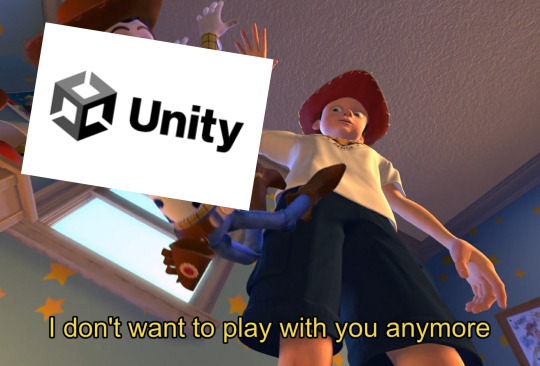
#in light of todays dogshit news#unity#unity news#game development#game developers#game devs#devs#game engine#unity3d#unity game engine#unity game development#hollow knight#silksong#cult of the lamb
671 notes
·
View notes
Text

Oh my fucking god, in most cases a demo counts as a download too what the fuck
336 notes
·
View notes
Text

TL;DR - Unity sent RocketWerkz (the dev of Stationeers) an email on May 9th (Friday) giving them ONE WEEK to correct several "violations" or have all their licensing revoked. All of the 5 supposed violations are bullshit; one person does not work on a Unity project at the studio, another person DOES have a paid and active Pro license, and three others who DON'T EVEN WORK THERE. Here's the Reddit thread linked in the Discord post for the full detail.
If you're considering using Unity : maybe don't
#video games#gaming#gamedev#game design#unity#unity3d#gaming news#unity game development#stationeers#indie games#indie dev#games#pc games#video gaming
7 notes
·
View notes
Text
How to Balance PvE and PvP in MMORPGs
Creating a successful MMORPG requires careful attention to one of the most challenging aspects of MMORPG game development: balancing Player versus Environment (PvE) and Player versus Player (PvP) content. When these two gameplay pillars are properly balanced, they create a rich, dynamic world that keeps players engaged for years. When they're not, your game can quickly lose its player base.

Why Balance Matters in MMORPG Game Development
MMORPGs thrive on diverse player preferences. Some players love raiding dungeons and defeating epic bosses, while others crave the thrill of outmaneuvering human opponents. The most successful MMORPGs don't force players to choose—they create ecosystems where both playstyles can coexist and complement each other.
As experienced developers know, imbalance can lead to serious problems:
Player exodus when one type of content receives preferential treatment
"Dead" game areas when certain content lacks meaningful rewards
Community division between PvE and PvP players
Power imbalances that make content trivial or frustratingly difficult
Core Principles for Balancing PvE and PvP
1. Separate Skill Systems When Necessary
One fundamental approach in MMORPG game development is implementing different rules for skills in PvE versus PvP contexts. Many abilities that work well against predictable AI enemies can become overwhelming when used against other players.
Consider World of Warcraft's approach: many crowd control abilities have different durations when used against players compared to monsters. This simple adjustment prevents PvP matches from becoming frustrating stun-lock festivals while still allowing those abilities to remain useful in dungeons.
2. Create Meaningful Progression Paths for Both
Players need to feel their preferred gameplay style offers legitimate advancement. A common pitfall in MMORPG game development is making the best gear exclusive to one content type.
Guild Wars 2 solves this elegantly by offering multiple paths to equivalent gear. Whether you're exploring story content, raiding, or competing in structured PvP, you're making meaningful progress toward your character's growth.
3. Design Complementary Reward Structures
Smart reward structures encourage players to engage with both content types without forcing them into gameplay they don't enjoy.
Final Fantasy XIV implements this brilliantly:
PvP offers unique cosmetic rewards and titles that don't affect PvE power
PvE progression rewards that remain relevant to casual PvPers
Seasonal PvP rewards that maintain engagement without creating power imbalances
4. Consider Scaling Systems
Scaling systems are increasingly common in modern MMORPG game development, allowing characters of different power levels to compete on more even terms.
Elder Scrolls Online's battle scaling system normalizes stats in PvP areas, ensuring that gear differences matter but don't make fights impossible. This approach lets newer players participate while still rewarding veterans' progression.
Technical Implementation Challenges
Skill Effect Modifiers
Implementing separate modifiers for skills across different content types creates additional complexity. Your system architecture needs to support contextual rule changes that can dynamically adjust how abilities function based on whether they're being used in PvE or PvP scenarios.
For example, a stun ability might last 5 seconds against a dungeon boss but only 2 seconds against another player. These contextual adjustments help maintain balance without creating separate ability sets.
Data-Driven Balance
Successful MMORPG game development requires continual refinement based on player behavior data. Implement robust telemetry systems to track:
Win rates in different PvP brackets
Completion times for PvE content
Class/build representation across content types
Economic impacts of different activities
This data forms the foundation for informed balance decisions rather than relying solely on player feedback, which often skews toward the most vocal community members.
Case Studies: Learning From Success and Failure
Guild Wars 2: Structured PvP Success
ArenaNet's approach to structured PvP in Guild Wars 2 represents one of the most elegant solutions in MMORPG game development. By completely separating PvP builds and gear from PvE progression, they created a truly skill-based PvP environment while allowing their PvE systems to scale naturally.
World of Warcraft: The PvP Power Experiment
Blizzard's introduction of PvP Power and PvP Resilience stats was an attempt to solve balance issues by creating separate gear progressions. While theoretically sound, this approach created problems:
Players needed separate gear sets for different content
PvE players felt forced into PvP to remain competitive
The system added complexity without solving core balance issues
The eventual removal of these stats and return to unified gear with contextual modifiers proves that simpler solutions are often better in MMORPG game development.
Integration Strategies That Work
Territorial Control With Benefits
Territorial PvP becomes more compelling when it offers benefits that extend to PvE gameplay. Black Desert Online uses this approach effectively, with guild warfare providing economic advantages that benefit both PvP-focused players and their more PvE-oriented guildmates.
Optional Flag Systems
Many successful MMORPGs implement flag systems allowing players to opt in or out of open-world PvP. This creates natural tension and excitement without forcing unwilling participants into combat situations they don't enjoy.
New World's territory control system exemplifies this approach, making PvP meaningful while keeping it optional for those who prefer PvE content.
Common Pitfalls to Avoid
In MMORPG game development, certain design decisions consistently lead to balance problems:
Making the best PvE gear require PvP participation (or vice versa)
Balancing classes primarily around one content type
Allowing gear advantages to completely overshadow skill in PvP
Creating "mandatory" grinds across content types
Neglecting one content type in major updates
Finding the Sweet Spot: Blending Content Types
The most successful MMORPGs find creative ways to blend PvE and PvP content:
ESO's Cyrodiil combines large-scale PvP with PvE objectives
FFXIV's Frontlines mixes competitive objectives with NPC enemies
Guild Wars 2's World vs. World incorporates PvE elements into massive realm warfare
These hybrid approaches satisfy both player types while encouraging interaction between different playstyles.
Conclusion
Successful MMORPG game development requires treating PvE and PvP balance as equally important, interconnected systems. By implementing contextual modifiers, separate progression paths, and data-driven balancing, you can create a game world where diverse player preferences are respected and rewarded.
Remember that perfect balance is never achieved—it's an ongoing process that requires constant attention and adjustment based on player behavior and feedback. The most successful MMORPGs view balance as a journey rather than a destination, with each update bringing the game closer to that elusive equilibrium that keeps all types of players engaged and satisfied.
By focusing on systems that allow both playstyles to thrive without undermining each other, you'll create an MMORPG that stands the test of time and builds a loyal, diverse community.
#game#mobile game development#multiplayer games#metaverse#nft#vr games#blockchain#gaming#unity game development
5 notes
·
View notes
Text
So is no one going to talk about how the CEO of Unity resigned? Like 👀
#unity game engine#unity game development#unity#unity 3d#everyone liked that#csharp programming#game developers#game development#haha#finalllyyyyy#codeblr
65 notes
·
View notes
Text
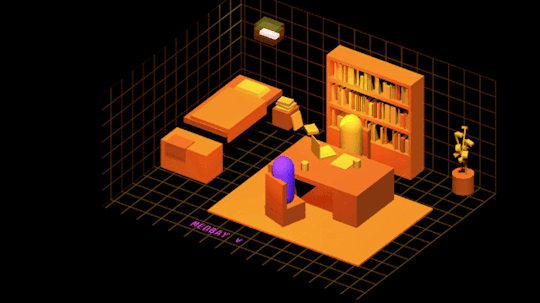


new locations from my game!
#the lights glow!#it was a quick little animation to throw together but it made me :)#indie game dev#game dev#game design#indie dev#video game#gaming#lofi aesthetic#sci fi#indie game#unity#unity game engine#unity game development#unity3d#devlog#game development#game screenshots#level design
11 notes
·
View notes
Text
AAA Games: A Comprehensive Guide

AAA games represent the pinnacle of gaming, combining high budgets, large teams, and advanced technologies to deliver exceptional experiences. With massive investments in development, marketing, and distribution, these games feature expansive worlds, captivating storylines, and stunning graphics. The use of cutting-edge technology like Unreal Engine and ray tracing enhances gameplay immersion. AAA games often belong to successful franchises, ensuring loyal fanbases and high engagement. To create a game of this caliber, partnering with a leading game development company is crucial. Choose the best game development company in India for innovation, expertise, and quality to bring your AAA vision to life.
#game development#game developers#unity game development#hire game developers#mobile games#game dev#hire dedicated development team#game development company#AAA Game Development#video games#AAA Game#mobile game development#game development services
2 notes
·
View notes
Text
Unity Game Development Company | Unity 2D-3D Game Development Company
Gamecrio Studios is a leading unity game development company in USA & India, that develops 2D & 3D games for all the platforms using advanced unity game development services.
2 notes
·
View notes
Text
Working on the new game (PCon)
Hi! It's been a while~!
During this time I was working on the new game in Unity called 'PCon - Is that ridiculous planet contest really the only way to save humanity?' (yeah, that's a long title XD).
As for now, I want to share with you a couple of things that I managed to finish!
The designs of all the characters are completed
The design of all the screens that appear in the game is completed
The main mechanics surounding the main game loop are completed in the most basic way (so it works, but will be better XD)
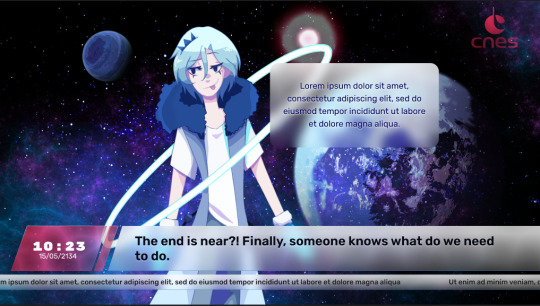

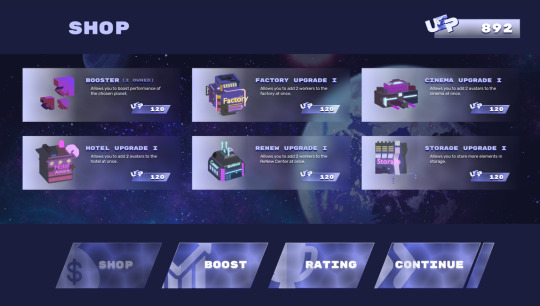
Next I'm going to focus on making sure that I can walk through the whole game, and theeen it will be just updating all the stuff that already works, making art and animations and writing dialogues.
I'm super excited for this game, because it's going to be something much different from the previous games! Still can't really say when is it going to be finished, but I hope it will be worth waiting for!
Thank you for sticking up with me! <3
#pcon#PCon - Is that ridiculous planet contest really the only way to save humanity?#indie game#gamedev#game design#game development#unity#unity game development#game update#update
18 notes
·
View notes
Text
Wave is back on Google Play
The situaționale that I’ve been through rn motivates me to release the update as soon as possible
#gamedev#devlog#game development#game leaks#unity game development#unity game engine#game programming#game project#indie games#indiegamedev
2 notes
·
View notes
Video
Applying different Textures to Objects in Code (C# and Unity)
#youtube#gamedevelopment#gamedev#coding#unity#unity game development#unity development#unitydev#RHCreations
3 notes
·
View notes
Text
Playtest Early Playtest Often 🎮

I created a short build of my game for friends and family to check out and see what they think about the game.
This wasn't easy to do emotionally!
I couldn't help but think of all the problems my game still has, or the rough edges that I am sure would annoy people. It felt to raw to really show people... But I did it anyway.
Here is why
I found out that a number of players were confused by the numbers placed over the towns. This number indicates how many passengers on your train want to go to a certain location. It was obvious to me, the person who designed and coded it. But not to others. If I continued on and waited to test my game, this information could have been lost and lead to further player confusion. But early playtesting nipped it in the bud.
Now I know I need to make this information more clear and change how it is displayed. Then in the next update not only will the game be more fun, and less buggy. It will also be more intuitive and understandable, thanks to my playtesters.
#game development#tutorial#unity game development#game design#cute#trains#playtesting#thanks for playing!
7 notes
·
View notes
Text
the only people who lost in this story is the unity, they lost a lot of money
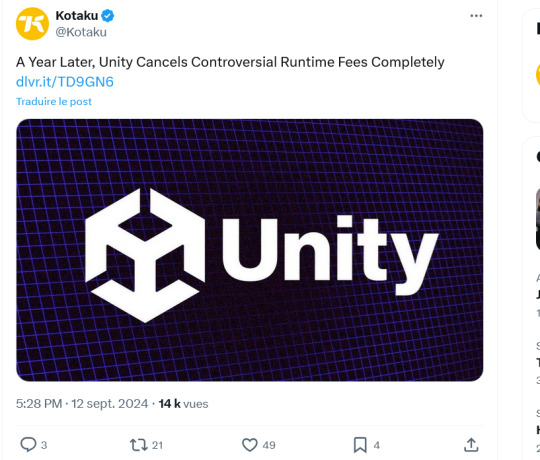
3 notes
·
View notes
Text
unity has closed two offices because they have received death threats which y'know like to charge reblog to cast 💖
13 notes
·
View notes